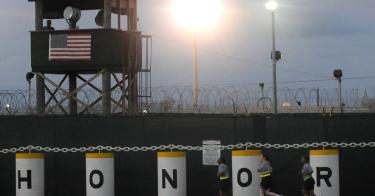Almost 13 years ago today, Jamal al-Harith was freed from Guantanamo Bay and returned to the U.K. But he won’t be celebrating the anniversary this year. Instead, he has blown himself up in Mosul on behalf of the so-called Islamic State.
What makes this suicide bombing unique was that Harith had been paid handsomely by the British government and the British press.
In March 2004, Harith was among the first batch of Guantanamo Brits to be released. Journalists clamored to get the exclusive tell-all stories. “If you’re not offering money, forget it” was what the detainees’ lawyers were telling journalists. That was seemingly not a problem for the Daily Mirror, whose interview with Harith subsequently ran under the sober headlines “TERROR OF TORTURE IN CUBA CAMP” and “BRIT’S TORTURE IN THE HELL CAMP.”
Next to give Harith a big payday was David Cameron. Eight British citizens or residents formerly detained at Guantanamo sued the British government for complicity in their detention, rendition, and alleged torture.
The government denied the claims. In March 2010, a Foreign Office spokesperson stated that “[t]he UK did not render, transfer, detain, mistreat or torture any of these individuals. Nor, as alleged, did we enter into some sort of conspiracy or joint enterprise either with the US or with any other state to do so.”
However, with around 250,000 files to go through and a case for the defense that would take about five years to prepare, Cameron complained that “our [security] services are paralysed by paperwork as they try to defend themselves in lengthy court cases with uncertain rules.” The government eventually decided to settle but not admit any liability. Harith was one of 16 British citizens and residents paid approximately a million pounds each in the subsequent out-of-court settlement.
It should, then, come as no surprise that Harith had the funds to be able to travel to Syria and join ISIS.
Harith’s actions will, one hopes, prompt newspapers like the Mirror to spend some time reflecting on their past promotion of Britain’s latest suicide bomber.
Consider how he was treated in his March 2004 interview. The Mirror reported that Harith, a convert to Islam in the late 1980s, flew to Pakistan just after the 9/11 attacks because he decided that was the right time to start “learning about Muslim culture and studying the holy book.” He then, claimed the Mirror, “accidentally strayed into Afghanistan” (it has happened to the best of us) and was captured in the back of a truck. He was initially detained by the Taliban, who thought he was a British spy, before the Americans eventually discovered him in a Kandahar jail. He ended up being transferred to Guantanamo.
During the interview, Harith alleged that U.S. guards told him he and his family would be murdered, he was constantly assaulted, and the U.S. tried to give him a “mystery injection.” The interviewer never challenged these allegations, and the Mirror’s accompanying editorial accepted them at face value. It claimed that “Jamal al-Harith has exposed the disgrace of what has gone on at Camp Delta… His story should make the international community insist that the Americans stop their shameful behaviour.” His treatment was called “barbaric.”
There is no proof that any of Harith’s allegations of abuse were true. There is far more proof that the U.S. had valid reasons to detain Harith. In July 2003, the Joint Task Force at Guantanamo assessed that he was affiliated with al Qaeda and likely to have been involved in a terrorist attack on U.S. targets (PDF). A polygraph test he took indicated that he was not telling the truth when he denied heading to Afghanistan to fight jihad or having connections to extremist groups.
Yet for some in the press, the truth is rarely as interesting as making salacious allegations against the state. Consider another case: that of Mahmoud Abu Rideh. When he was being kept under a control order in the U.K. due to the threat he posed to national security, The Guardian and Independent couldn’t publish enough stories complaining about what a disgrace it was that this innocent, mentally incompetent, saintly chap was being treated with such suspicion. Yet when Rideh was released from his control order and killed in an airstrike on an al Qaeda convoy in Afghanistan shortly after, the same publications did not even cover the story.
A trend has developed. Terror suspects’ claims of abuse are treated with utter credulity while denials from intelligence agencies and the military are treated with utter skepticism. Terror suspects are elevated and their views brought into the mainstream; security agencies are slandered and trust in them undermined.
Perhaps eventually there will be enough Jamal al-Hariths to break this cycle. Until then, the least we can expect from the press is to treat such men with even a fraction of the skepticism with which they heaped on those safeguarding our security.
The Heritage Foundation’s Margaret Thatcher fellow, Robin Simcox specializes in national security and terrorism issues at the Washington, D.C.-based think tank.
This piece originally appeared in the Daily Beast



